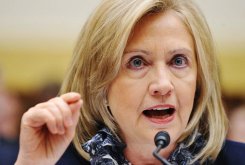 |
| © AFP Mandel Ngan |
WASHINGTON (AFP) – The United States will take action if Venezuela violates international sanctions against Iran, Secretary of State Hillary Clinton warned Tuesday as she defended outreach to the Cuban people.
“If there is any evidence that they have violated the sanctions, we will act against them,” Clinton told lawmakers during a congressional hearing.
But the top US diplomat also acknowledged there was no evidence so far that the regime of firebrand leftist leader Hugo Chavez had violated sanctions against Iran over its nuclear program, which Western powers believe seeks to build nuclear weapons.
Washington is closely examining whether Venezuela’s cooperation with Iran on energy issues violates international sanctions on the Tehran regime after the two major oil producers and longtime US foes signed 11 deals in Tehran focused on energy cooperation in October Chavez and Iranian President Mahmoud Ahmadinejad both denounced American “imperialism” and called for a “new world order” during the visit, part of the South American leader’s efforts aimed at strengthening Venezuela’s economic ties with eastern Europe and the Middle East.
“Currently, our best information is that their relationship is largely diplomatic and commercial and has not moved in the direction they keep talking about. But we follow it closely,” Clinton told the House Foreign Affairs Committee.
Republican Representative Connie Mack, a Florida Republican who wants Venezuela to be added to the State Department’s list of state sponsors of terror, argued that there was evidence Venezuela was shipping fuel to Iran.
“We have seen a lot of statements and contracts coming out of Venezuela, but we don’t see much follow-through yet,” replied Clinton.
But she criticized Chavez’s fiery rhetoric as “deeply troubling and deplorable.”
Republicans, who now hold a majority in the House of Representatives, lambasted the Obama administration for having eased some sanctions against Cuba.
“We seem to be making concessions and seem to be doing all the things that the Cuban government wants,” said Albio Sires, a Cuban-born New Jersey congressman.
But as Cuban President Raul Castro is in the process of implementing economic reforms, “we think maintaining a very positive approach to the people of Cuba, letting them know that the US government and the American people support their freedom, their eventual democracy, we think it is in their interest.”
In January, Cuba began a process of axing 500,000 state employees as part of an ambitious overhaul designed to build up a private sector in an economy that has been run on communist lines by the government since Fidel Castro took power in 1959.
The layoffs were to have been completed in March this year.
But Castro has since admitted he will need “at least five years” to see through the reforms.
The United States and Cuba, the Americas’ only communist-ruled, one-party state, do not have full diplomatic relations. A full US economic embargo has been clamped on Havana since 1962.
While President Barack Obama’s administration has adjusted US policy to some extent, no dramatic strides have been made in recent years.
© AFP — Published at Activist Post with license


Be the first to comment on "Clinton warns Latin American over ties with Iran"